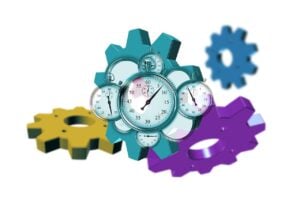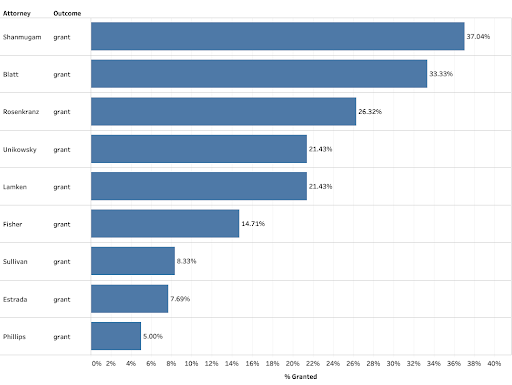Cert By The Experts
Grant rates for top Supreme Court practitioners who have not served as Solicitor General.
 Ed note: This article first appeared on The Juris Lab, a forum where “data analytics meets the law.”
Ed note: This article first appeared on The Juris Lab, a forum where “data analytics meets the law.”There are two Supreme Court bars in common D.C. parlance.
The first is the quintessential Supreme Court Bar that lawyers must belong to in order to practice before the United States Supreme Court. The second is a tongue in cheek way of indicating a small batch of repeat player Supreme Court specialist attorneys with high levels of success.

How Savvy Lawyers Build Their Law Firm Rate Sheet
While the second definition is a colloquial description of this group of attorneys, there is little empirical evidence supporting the proposition that they are more successful than other attorneys.
One of the benefits of the Supreme Court bar of experienced attorneys is that they know the material that will be most beneficial to the justices in the cases they try. Chief Justice Roberts articulated as much in an essay for the Journal of Supreme Court History that he wrote before he joined the Court.
The bulk of the justices’ and their clerks’ time is spent, at least in terms of total documents examined, scouring petitions for cert and associated amicus briefs. These 8,000 or so petitions are whittled down to 70 or so merits cases for oral argument each term.
At least a substantial minority of these cases each year come from members of the Supreme Court bar of experienced attorneys. A previous post on this blog examined the cert grant rates from a portion of these experienced attorneys — those who previously worked as United States Solicitors General.
Sponsored

Not All Legal AI Is Created Equal


How To Build And Manage Your Law Firm Rate Sheet

All Aboard! How To Get Intake Right In A Law Firm

How To Build And Manage Your Law Firm Rate Sheet
This post examines cert grant rates for other established members of the Supreme Court bar that were not covered in the previous post. Top ranked nationwide appellate attorneys from Chambers and Partners in Band 1 and Star Individuals that were not previously Solicitors General were used in this sample.
Jenner and Block’s Adam Unikowsky (a Band 4 attorney) was added to this list as he has performed uniquely well before the Supreme Court according to a prior statistical analysis. Other attorneys in this study include Lisa Blatt (Williams & Connolly), Josh Rosenkranz (Orrick), Kannon Shanmugam (Paul Weiss), Jeffrey Fisher (O’Melveny & Myers / Stanford Law School’s Supreme Court Litigation Clinic), Miguel Estrada (Gibson Dunn), Kathleen Sullivan (Quinn Emanuel), Carter Phillips (Sidley Austin), and Jeffrey Lamken (MoloLamken).
As with the prior article, this article looks at cert petitions filed between January 1, 2017, and December 31, 2020, with the attorney’s name on the cover. 190 petitions for cert were included in this sample. A second sample of 100 randomly drawn paid petitions from this period was used for comparison purposes.
168 petitions remained in the experienced attorneys’ sample after dismissed and pending petitions were removed. 34 or 20.24% of these were granted by the Supreme Court. The first graph depicts the raw counts of petitions filed by each of the experienced attorneys.

Sponsored

How Savvy Lawyers Build Their Law Firm Rate Sheet

Trust The Process: How To Build And Manage Workflows In Law Firms
If we examine petitions filed by batches of 10 we see that Jeffrey Fisher and Kannon Shanmugam make up the pile of 30 petitions or more, Josh Rosenkranz and Carter Phillips are in the stack of 20 to 30 petitions, and all other attorneys in this group filed between 10 and 20 petitions. The next graph tracks these attorneys’ success at cert.

Two attorneys, Kannon Shanmugam and Lisa Blatt, were successful in well over 30% of their petitions filed. Josh Rosenkranz, Adam Unikowsky, and Jeffrey Lamken also all performed better than the average for former-SG’s cert success from the prior post. More on that in a moment.
To see how the Supreme Court bar members performed compared to a random sample of petitions, 100 petitions were randomly drawn. Of these petitions two were dismissed and one was granted, vacated, and remanded (GVRed). These were removed from the analysis. Five of the remaining 97 petitions or 5.15% of these petitions were granted (Click here for the data from the random sample).

Somewhat surprisingly, when cert successes for each of the three groups studied in both posts are individually averaged, the top performing group is the one composed of non-former SG Supreme Court bar attorneys.
Adam Feldman runs the litigation consulting company Optimized Legal Solutions LLC. For more information write Adam at afeldman@thejurislab.com.
Find him on Twitter: @AdamSFeldman.
Click here for data from the post.







